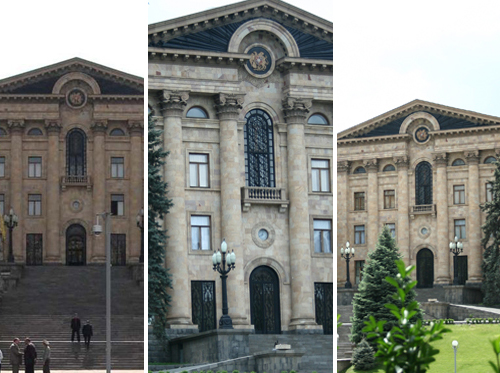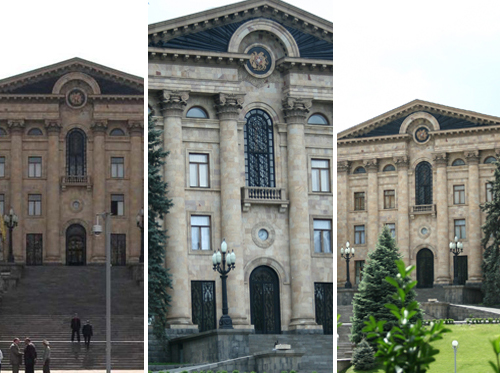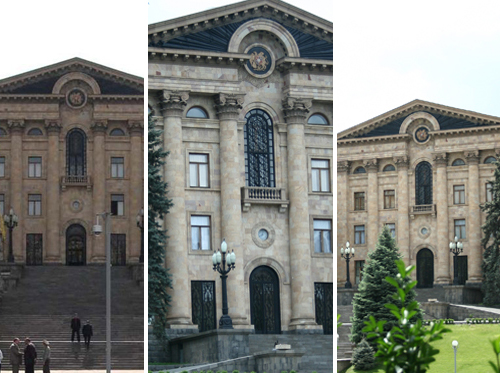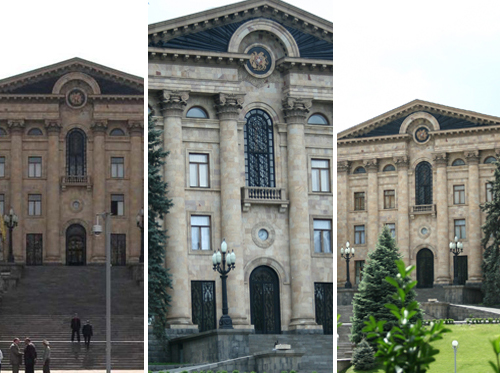Ahead of May 6 elections to the Armenian National Assembly of 5th convocation, Mediamax continiues the special project: “National Assembly Elections: v1.0-v4.0”, which aims to present the most interesting facts and events of 1995, 1999, 2003 and 2007 elections.
Elections to the National Assembly of the Republic of Armenia of the third convocation were held on May 25, 2003 (131 parliament members: 75 under proportional and 56 under majority vote system). Just like in 1999, 21 parties and a bloc took part in elections.
A referendum on making amendments to the Constitution was held simultaneously with parliamentary elections. However, the Armenian voters did not support the draft constitutional amendments submitted by President Robert Kocharyan.
It's noteworthy that it was the first time in Armenia's history that parliamentary elections were held not only the same year with the presidential ones but only two months after them.
Elections to the parliament of the third convocation were unprecedented by low voter turnout. According to the final data of the Central Electoral Committee, the voter turnout stood at only 51%.
Six parties and a bloc overcame the 5 percent threshold: “Republican Party of Armenia” -23,66% (23 parliament members,) “Justice” bloc -13,71% (14 parliament members), “Orinats Yerkir” Party -12,60% (12 parliament members,) Armenian Revolutionary Federation- Dashnaktsutyun - 11,45% (11 parliament members), “National Unity”- 8,91% (9 parliament members), “United Labor Party” -5,67% (6 parliament members.)
Six factions were created in the National Assembly: “Armenian Republican Party” - 40 parliament members, “Orinats Yerkir” - 20 parliament members, “Justice” -14 parliament members, Dashnaktsutyun -11 parliament members, “National Unity” - 8 parliament members, “United Labor Party” - 6 parliament members and a parliamentary group “People’s Deputy” - 16 parliament members. Fourteen parliament members were not included into factions and parliamentary groups.
No political party managed to gain an absolute majority in the parliament and independently form a government. This is why, for the first time in the history of the third republic, three parties that have gained the majority of votes - RPA, “Orinats Yerkir” and Dashnaktsutyun - created a political coalition and jointly formed a government.
Scandals
The election race and the elections to the parliament of the third convocation were held against the background of very significant events: in particular, the referendum on making amendments to the Constitution, weekly rallies of the opposition, former presidential candidate Karen Demirchyan's law suit in the Constitutional Court on annulling the results of presidential elections, disputing of the 10-year citizenship of President Kocharyan in the Court of Appeal.
The main scandal was the armed incident at a polling station in Shahumyan village of Armenia's Ararat region on the election day, as a result of which one man was killed and two others wounded.
Galust Sahakyan vs Vahan Hovhannisyan
The head of RPA election headquarters, Galust Sahakyan, accused the member of Dashnaktsutyun Bureau Vahan Hovhannisyan of an attempt to disrupt the normal course of parliamentary elections and the constitutional referendum. Sahakyan claimed that Vahan Hovhannisyan, accompanied by three dozen people, burst into the territory of N 30 electoral district in Bambakashat village of Armavir region and engaged in a squabble there. Vahan Hovhannisyan said he only prevented an open voting.

Galust Sahakyan vs Vahan Hovhannisyan
“Courtesans”
During the election marathon, a fierce rivalry began to develop not only between the authorities and the opposition, but also in the camp of the supporters of authorities. The head of RPA election headquarters Galust Sahakyan again distinguished himself. During election battles, RPA leader, Prime Minister Andranik Margaryan urged not to answer to rivals' blows even if they were “below the belt”. Despite all this, Galust Sahakyan nicknamed “Orinats Yerkir” and “Dashnaktsutyun” parties as “courtesans, who try to satisfy both the people and the authorities”, and said “he won't respond to blows below the belt only if they please the RPA”.
Several weeks later, RPA, “Orinats Yerkir” and Dashnaktsutyun would create a ruling coalition for the first time in Armenia's history, and Galust Sahakyan would say that “Orinats Yerkir” and Dashnaktsutyun should not be offended with the epithet “courtesans”...
Gegham Manukyan: “The idea of the coalition belonged to ARFD”
Director of “Yerkir Media” TV Gegham Manukyan was the spokesman for “Dashnaktsutyun” at that time and became member of the parliament of the third convocation.

Gegham Manukyan
“The idea to create a coalition belonged to Dashnaktsutyun. The paper on which we drew the scheme of the coalition with Prime Minister Andranik Margaryan is still in my personal archives. Even the word “coalition” was first pronounced by ARFD in Armenia.
What were the chances of the opposition at elections and could it really fight against the authorities during parliamentary elections? The results showed that no, it couldn't. The fight of personalities is not persuasive for people, the fight of programs is much more important. I remember that Dashnaktsutyun's program was very revolutionary and oppositional, and it was manifested in our work in the government.”
Media on elections
“To all appearances, there will be big businessmen, who have taken effective places in party lists, in our future parliament. And it means that by the rules of socialistic political economy, it is the blossom of real imperialism, when the industrial, banking and criminal capitals merge with the existing power. Now real capitalism will come with a brutal predatory grin, of which the Soviet propaganda has once brutally warned us and which we have quietly and secretly dreamed of as a forbidden fruit. Well, let's see how sweet it will taste,” “Aravot” daily wrote on the eve of elections.
The forecasts of “Golos Armenii” did not possess much optimism either: “The new parliament will be the continuation of two previous ones with the dominating representation of a silently listening overwhelming majority, which will obediently press the buttons. Like in the previous parliament, there will hardly be some 10-15 people in the new parliament who are able to do legislative work. There will be also some 5 populists from radicals and pro-governmental forces that will always be on the arena with no tangible benefit. The portfolios of chairmen of standing commissions will be given to pro-governmental parties. The speaker and at least one of his two deputies will be from those whose names are in top ten of republicans' election list. Pro-governmental factions will serve the government, whereas on the radical wing, i.e. in the list of “Justice”, there are simply no people who can engage in a bright political polemics. So, the new parliament will be as non-political as the two previous ones. ”
Observers and their assessments
It's noteworthy that the assessments of the observers coincided those of presidential elections. The CIS observers again said that the parliamentary elections were “legitimate and democratic” and “minor violations were not massive”. At the same time, OSCE/ODIHR, OSCE PA and PACE observers stressed that despite significant progress, as compared to recent presidential elections, the parliamentary elections in Armenia failed to meet international standards.

Photo: www.telegraph.co.uk
The European observers expressed the hope that “there will be no return to the atmosphere of impunity, which began at recent presidential elections”. They also expressed concern over extensive violations observed during vote counting.
At the same time, international observers noted that the low voter turnout bears witness to significant decrease of people's confidence in electoral processes.
The head of the Observation Mission of the Parliamentary Assembly of the Council of Europe (PACE), Lord Russell-Johnston, expressed doubt over the credibility of data provided by the Central Electoral Committee of Armenia about the voters' participation in elections. “I wonder how half an hour before the closure of polling stations the voter turnout was 43 %, and after the voting the figure grew up to 51%,” he said.
The United States urged upon the Armenian government to “rapidly react” to key provisions of international observation missions' conclusions on parliamentary elections in the country. US representative Douglas Davidson said the “double assessment of Armenian parliamentary elections is especially disappointing in view of huge progress Armenia has achieved over last 11 years in building a modern society, which the people and the government of this country can really be proud of.”
Hovanes Hovhannisyan, Former head of the Armenian delegation to PACE: Lord Russell-Johnston was in a shock
At that period Hovanes Hovhannisyan was the head of the Armenian delegation to PACE and the head of Armenian Parliament's Standing Committee on Foreign Relations. He withdrew his candidacy on the election day and refused to continue the fight under a majority vote system on N45 electoral district.

Photo: Photolure
“There was a “European boom” in Armenia in 2002-2003: two years before that, we became full members of the Council of Europe, and launched an active cooperation with the EU and NATO. In was sure that the upcoming parliamentary elections should have been held in line with commitments Armenia had undertaken. However, I was deeply disappointed after seeing the election lists of ruling parties. They comprised new people who had absolutely nothing to do with politics, so called “half-oligarchic elements”.
Lord Russell-Johnston, who has done a lot for Armenia, was shocked in the very sense of the word. The European observers' short-term and long-term reports contained harsh assessments. However, they changed nothing.
Presidential elections, which were held in two phases two months before the parliamentary ones, had left a heavy aftertaste both on the country and on the people. I think, people were deeply disappointed after the elections and this is why there was a low voter turnout during parliamentary elections.”
Post election developments
Like in 1995, the opposition again considered the possibility of boycotting the new parliament. “Justice” issued a statement the next day after the elections, saying that the bloc did not recognize the results of elections. The head of opposition's election headquarters, Stepan Demirchyan, said the parliamentary elections in Armenia were much worse than the presidential ones and were “disgraceful”. According to him, if the parliamentary elections were democratic and fair, the opposition would have won over 50% of votes.
Finally, the political board of “Justice” decided not to refuse their mandates and boycotted only the first session of the National Assembly on June 12, which elected the new leadership of the parliament.
Conclusion
The National Assembly of the third convocation began its activity on 12 June 2003 and finished it on 9 April 2007. Artur Baghdasaryan was elected National Assembly chairman; Tigran Torosyan and Vahan Hovhannisyan were appointed deputy speakers. On 22 May 2006, Artur Baghdasaryan resigned and on June 1 Tigran Torosyan was elected National Assembly Chairman.




















